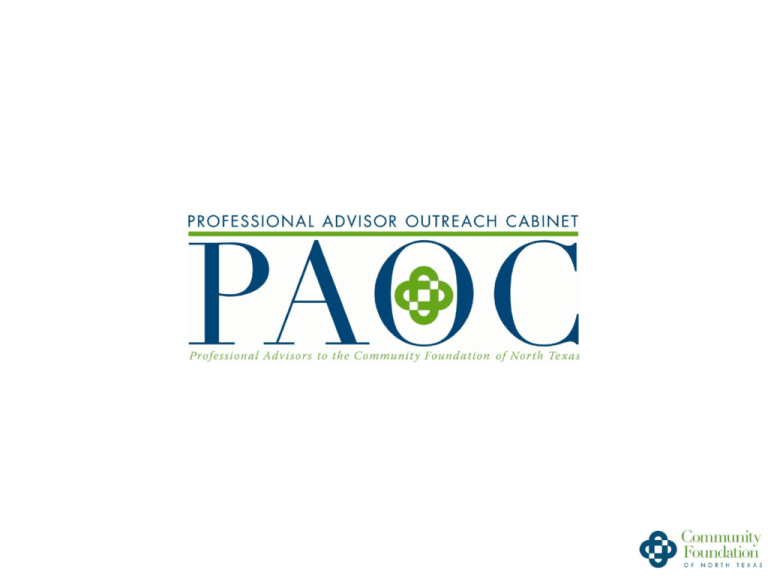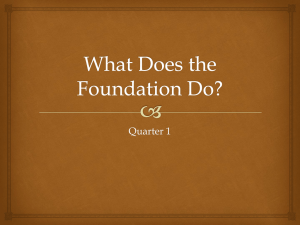Charitable Planning - Community Foundation of North Texas
advertisement

Charitable Planning ... using a Community Foundation Allyson Baumeister, C.P.A. John Hunter, J.D., C.P.A. Nancy E. Jones October 4, 2011 Community Foundation of North Texas Top 10% Established in 1981 Assets: $145,000,000 Total grants 2010: $ 8 million Total grants since 1981: $130 million CFNTx Assets 1985-2010 $160,000,000 $140,000,000 $120,000,000 $100,000,000 $80,000,000 $60,000,000 $40,000,000 $20,000,000 $1985 1988 1991 1994 1997 2000 2003 2006 2009 2010 2011 2010 CFNTx Grant Dollars Sports/Leisure 1% Animal <1% Arts/Culture 5% Civic 12% Religion 30% Education 21% Human Services 31% Environmental <1% When should you be thinking about using a Community Foundation ? Trigger points Client is selling a business Wants to establish a private foundation with less than $5 – 10 million. Closely held shares or highly appreciated non cash assets Client is transferring wealth to generations Client is making charitable gifts in a will Deductibility Gifts of cash are deductible up to 50% of AGI (30% AGI in PF ) Gifts of appreciated property are deductible up to 30% of AGI. (20% in PF) Gifts of closely held stock are deductible up to 30% of AGI (limited to COST basis in PF) Additional considerations NO 5% minimum spend rate from a CF fund NO excise tax on investments in a CF NO separate audit NO mandatory Form 990-PF filing Self-dealing issues minimized Comparison Advantages Disadvantages Ease, little paperwork No ultimate control No 990, no separate audit Investment choices Anonymity or Some Grants not possible recognition Choices of Investments Family Involvement Maximum Tax Deductibility Local knowledge No minimum 5% payout Self dealing not an issue (tables, scholarships, grants to individuals) Donor does not have prestige of own Foundation Designated Fund Client can assist a charity without giving the charity ultimate control of gift Can set up “If, then” constructs CF as 3rd party ensures compliance with restrictions Bequests Often easier to use the foundation to make all the charitable distributions for an estate; Use a side letter to provide detailed instructions and conditions (Client’s will cites the Fund) Private Foundation Transfer Private foundation administration may become burdensome or costly Transfer assets to a donor advised fund at the Community Foundation and terminate private foundation status. Foundation’s name carries over to the donor advised fund Procedures for Converting a Private Foundation Execute a donor advised fund agreement to name fund and advisor(s) Pay any investment excise taxes owed prior to dissolution The private foundation files a Form 990-PF for the termination year. John D. Hunter, J.D., C.P.A. The Blum Firm, P.C. Vice-Chair, Professional Advisor Outreach Committee for the CFNT Benefits of Using Community Foundation of North Texas Local Leadership and administration are just down the street Knowledgeable Nancy Jones understands! Uses sophisticated counsel Client-Friendly 2-3 page agreements (not 14!) Wants to sit down with and get to know client Clients have all had positive feedback Benefits of Using Community Foundation of North Texas (continued) Consistency Flexibility Can use own investment manager if assets large enough Will base investment decisions on timing of expected distributions McCord Transfer: Sale of Shares Client sells X shares to the Dynasty Trust in exchange for a Promissory Note Promissory Note for $Y Million Client Community Foundation of North Texas Estimated $C Stock with FMV = $Y Million Amount Above $Y Million Dynasty Trust No Net Gift $Y Million = FMV of X shares less charitable gift amount (C) as determined by appraisal McCord Transfer: Valuation Agreement Dynasty Trust Valuation Agreement Community Foundation of North Texas McCord Transfer Technique (to Donor Advised Fund with Valuation Agreement) Provides third party confirmation of value Transfers wealth to the next generation Establishes a donor advised fund There is some 4958 risk if the value is too low Estate/Gift Tax auditors are not tax-exempt auditors McCord Transfer Technique (to Donor Advised Fund without Valuation Agreement) Provides third party confirmation of value Transfers wealth to the next generation Establishes a donor advised fund Avoids Gift Tax Risk that more goes to charity because of audit McCord Transfer Technique (to CFNT Designated Fund or CFNT Field of Interest Fund) Same facts but establishes designated fund or field of interest fund Provides valuation certainty Tested in Fifth Circuit Allyson B. Baumeister, CPA, Partner Sanford, Baumeister & Frazier, PLLC Chair, Professional Advisor Outreach Committee for the CFNT The Community Foundation as a Partner in a Business Sale Sale Scenario Business owner is selling stock in closely-held company Owner wants to make a charitable gift of company stock prior to the sale Owner wants to maximize the charitable contribution to the organization as well as his contribution deduction for tax purposes The Community Foundation as a Partner in a Business Sale (Cont.) Steps for Owner to take for tax deduction purposes Must obtain appraisal of company stock prior to sale by qualified appraiser Must make charitable gift prior to sale Must work with Community Foundation in accomplishing the above steps Community Foundation sells the stock that they have received for full fair market value as of date of sale Gift can be spread out over period of time as sales proceeds are received The Community Foundation as a Partner in a Business Sale (Cont.) Results of charitable transfer prior to sale Owner receives a tax deduction for the full fair market value of the stock as of the date of contribution Owner does not recognize gain on sale of the stock that is transferred to the Community Foundation Foundation receives full sales proceeds related to the stock that they have received at the time of sale and at the time of any future payments associated with the sale The Community Foundation as a Partner in a Business Sale (Cont.) Results of charitable transfer prior to sale Community Foundation receives a larger contribution since no tax is paid on the gain resulting from the sales transaction Owner is able to accomplish charitable goal and withstand IRS scrutiny as long as the Community Foundation receives proceeds equal to or greater than the amount of the appraised value and charitable deduction claimed. Questions and Comments







